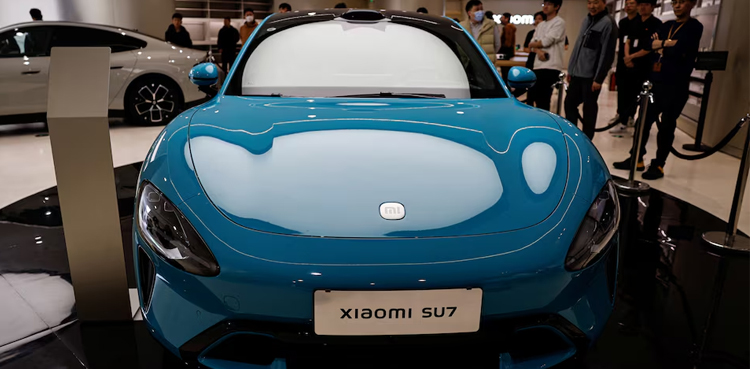Xiaomi’s entry into China’s EV market has caused a stir, with its SU7 sedan selling over 7,000 units in April. This cements the smartphone giant’s position as the country’s eighth-largest EV newcomer and sets the stage for a heated competition with established players like Volkswagen and Tesla. The company aims for 100,000 deliveries this year.

BEIJING/SINGAPORE: Chinese smartphone maker Xiaomi has become the country’s eighth-largest electric vehicle upstart after selling more than 7,000 units of its first model, the SU7 sedan, in April, according to industry data.
Xiaomi’s strong entry into China’s crowded EV market is set to further upend the world’s largest auto market, where companies have been locked in a fierce price war amid weakening demand. Xiaomi is already a household name in China for its popular smartphones and home appliances.
It joins other upstarts like Nio and Xpeng as new automakers focused on EV production. The category excludes legacy brands like Volkswagen and established EV makers such as Tesla, BYD and Geely.
Xiaomi sold 7,058 SU7s in April, its first full monthly sales since the model was launched in late March, and it is targeting more than 100,000 deliveries this year, which would correspond to monthly average sales of 11,618 units for the remainder of the year.
It replaced the Avatr EV brand from state-owned Chongqing Changan Automobile as the country’s eighth-biggest EV upstart, according to Reuters’ analysis of monthly sales data from ByteDance’s car information platform Dongchedi.
China’s EV market has been crowded by an increasing number of upstarts that include pure EV manufacturers such as Nio and Xpeng as well as EV sub-brands from traditional automakers including GAC’s Aion and Geely’s Zeekr.
Huawei-backed Harmony Intelligent Mobility Alliance (HIMA) is also among the new upstarts. Brands under the HIMA include Aito and Luxeed and their combined EV sales totalled 20,819 units in April, according to Dongchedi data.
Some Huawei vehicles such as the Aito M5 and M9 come in both extended-range and pure EV variants and both versions are counted in as EVs, meaning its actual pure EV sales would be lower than the reported figure. Dongchedi does not provide a sales breakdown of those variants.
Xiaomi’s estimated monthly sales of more than 11,000 units for the remainder of the year also puts it in a close competition with Volkswagen, which has fared better than most other foreign legacy auto brands in competing with Chinese EV players.
VW delivered 13,108 EVs in April under its ID series through two Chinese joint ventures, with the models starting at a lower price than Xiaomi’s standard SU7 at 215,900 yuan ($29,845.59).
The market is set to turn even more bullish on Xiaomi in coming years, according to some analysts. HSBC Qianhai forecasts sales of the Xiaomi vehicle at 240,000 units in 2025 and 348,000 units in 2026.
Local champion BYD topped China’s EV sales rankings with 120,234 units last month. Sales were largely driven by affordable models much cheaper than the SU7.
U.S. giant Tesla netted 31,421 units in Model 3 and Y sales in April.
Xiaomi’s base model SU7 is about $4,000 cheaper than the base model of Tesla’s Model 3 in China.
As EV makers grapple with growing competition in the China market, many are now shifting their focus to overseas markets.
China’s passenger vehicle exports surging to a record high in April, whereas domestic sales contracted 5.8% from a year earlier, data from the China Passenger Car Association showed.
($1 = 7.2339 Chinese yuan renminbi)
Xiaomi has been on a winning streak lately, with the recent successful launch of the highly anticipated SU7. This achievement has only added to the company’s growing list of accomplishments in the tech world. Amidst the positive buzz surrounding the SU7, Xiaomi has received another bout of good news that further solidifies its position in the market. The tech giant’s unwavering dedication to innovation and quality has undoubtedly played a pivotal role in this ongoing success, leaving fans and industry experts eager to witness what the future holds for Xiaomi.
Source: ARY NEWS
Xiaomi, China’s renowned smartphone manufacturer, has made a significant foray into the electric vehicle (EV) market with its SU7 sedan, selling over 7,000 units in April. This achievement has positioned Xiaomi as the country’s eighth-largest EV upstart, intensifying competition in China’s burgeoning EV sector. The company’s aggressive sales target for the year and its competitive pricing compared to established brands like Volkswagen and Tesla underscore its potential impact on the market. As EV manufacturers increasingly target overseas markets amidst domestic sales challenges, Xiaomi’s successful entry into the EV space signals a new era of competition and innovation in the automotive industry.
Disclaimer:
This content is AI-generated using IFTTT AI Content Creator. While we strive for accuracy, it’s a tool for rapid updates. We’re committed to filtering information, not reproducing or endorsing misinformation. – Khabristan.pk for more information visit privacy policy








Leave a Comment